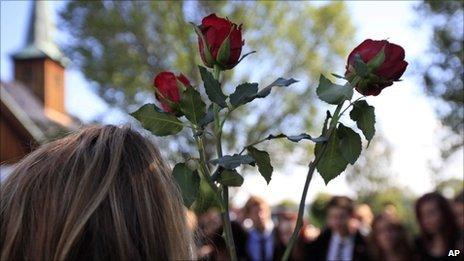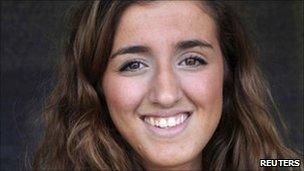Remembering Norway's 'lost generation'
- Published

Ms Rashid's was the first Muslim burial at Nesodden
Norway seemed to stand still, not once, but several times today. Exactly a week after Anders Behring Breivik first bombed government buildings in central Oslo, then shot at youngsters on the island of Utoeya, the nation took the chance to reflect.
At 1300 local time (1100 GMT), at the "folkhus" or people's house, Norway's prime minister joined members of the Labour Party to remember the dead.
Colleagues and friends of those who died hugged each other after moving readings and songs, a single rose held by each.
The prime minister spoke for many who feel that it is determination that will get them through the grief.
"It is impossible to comprehend what these young people went through during these gruesome hours. But we have to go on and live with the burden of the 22 July. It will be hard. It will be difficult. But together in unity, we will manage," he said.
'Even more love'
At the same time, a short ferry ride away, another life was remembered. In a leafy and idyllic setting, the small wooden church in Nesodden saw its first-ever Muslim burial, Christian pastor and Muslim imam united to lead the remembrance of Bano Rashid, a popular and outgoing 18-year-old of Kurdish decent.
Shot at her annual summer camp on Utoeya, she was a popular, lively young woman who worked as an activist for the Labour Party here, and had ambitions to be a politician.
Her bright and optimistic face smiled out of the photo held aloft at the front of her funeral procession. With dignity through tears, her sister walked with her coffin - she too was at the camp, but survived Mr Breivik's massacre.
Ms Rashid's family followed behind. Onlookers confirmed that they are part of a well-integrated Kurdish community here, who left Iraq over 15 years ago. "The answer must not be hatred, but even more love," her mother Beyan told the attending media afterwards.
The doors of the church were left open, and the crowd outside stood in the fierce sunshine to hear the service. Many had to leave the service at times to sit under nearby trees, as the heat and emotion became too much. The message here too was that Norwegians do not want to meet intolerance with intolerance.
"An imam and a pastor side by side for this funeral is a very powerful message," Norwegian Foreign Minister Jonas Gahr Stoere said after the service.
Not bowed
Traditionally reserved, the Norwegians have met the tragedy with dignity - almost everyone here refers to meeting Mr Breivik's hate "with love". One student who didn't want to be named told us that she felt sorry for him. "He's obviously a very sick man," she said.

Friends described Bano Rashid as an inspiration
Mr Breivik was questioned again today, and police confirmed they do not think he is linked to a network of terrorists, as he has proclaimed in his "manifesto", a 7,000-word document published on the internet shortly before his rampage.
Police lawyer Paal Frederik Hjort Kraby said he was calm and controlled during his interview, which today went through his last statement of around 50 pages.
"He was more than willing to explain himself about the things he had done," Mr Kraby said. Mr Breivik's lawyer has already said publicly that he thinks his client is insane.
Police released a new death total of 77 today, up from 76, each death part of what has been described as a "lost generation" of would-be politicians and activists.
Back at the funeral of Ms Rashid, however, her friends would not be bowed.
"Her death won't scare Muslims like me away from politics," said her childhood friend and fellow Kurd, Siva Jagdar.
"If anything she has been an inspiration in life, and I hope she will be an inspiration still, to show Norway what we can be... I hope Bano can be a symbol for Norway's youth, for Christian youth, for Muslim youth, for Kurdish youth. To show everyone that they can follow their dreams."